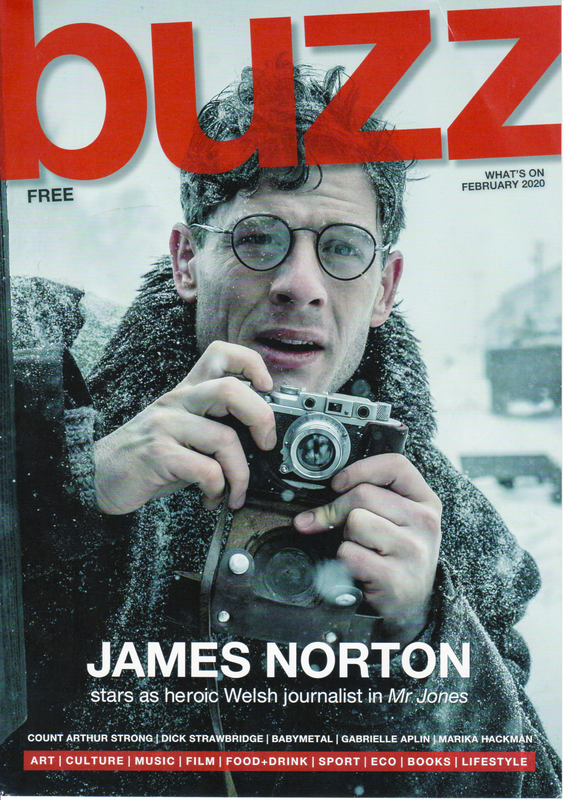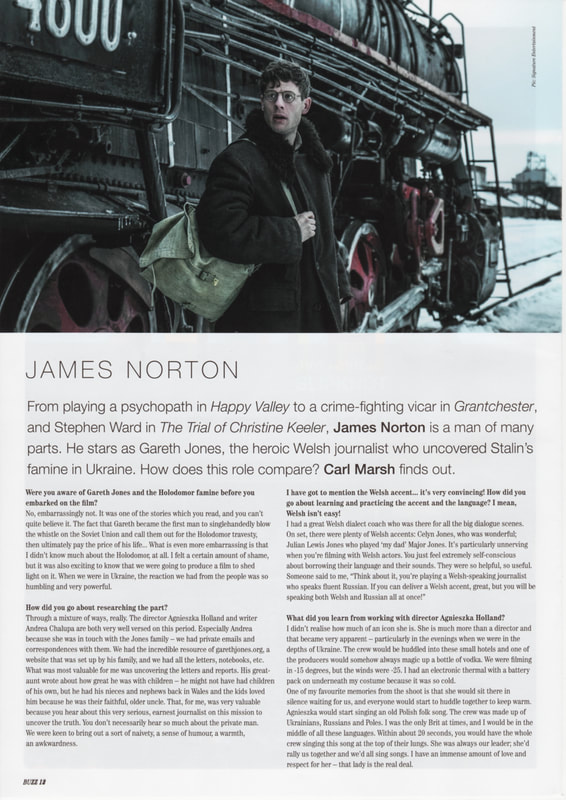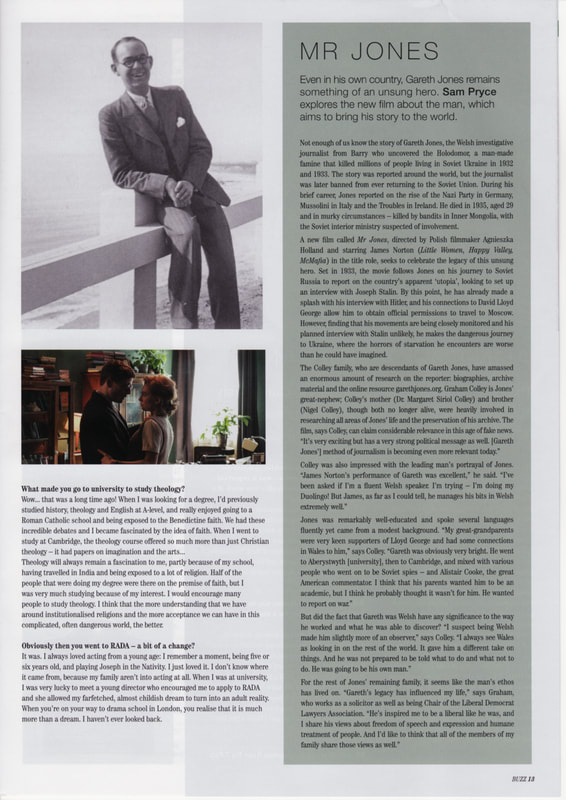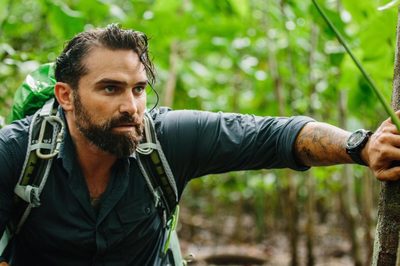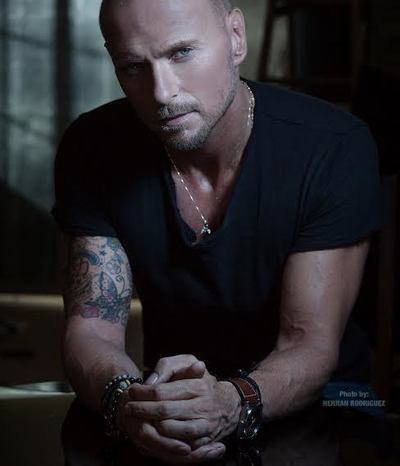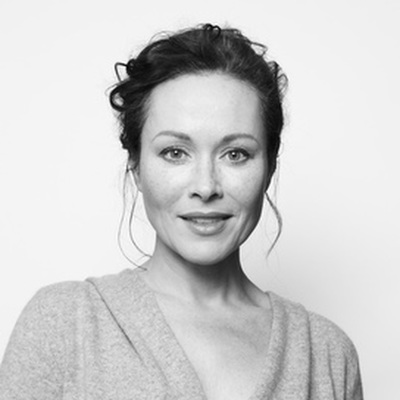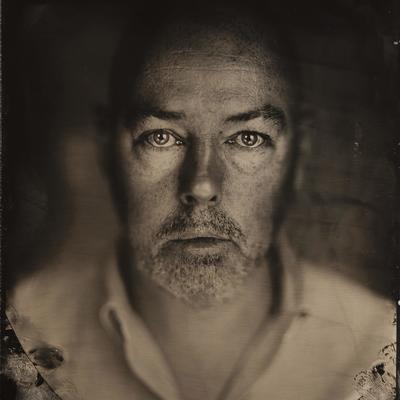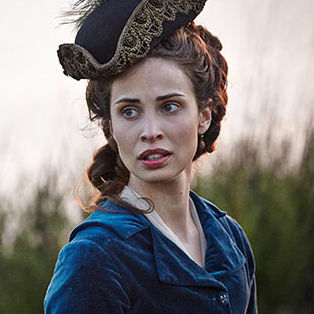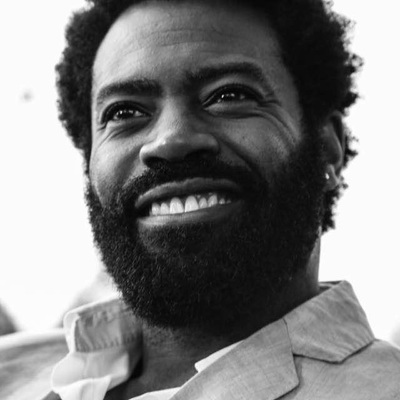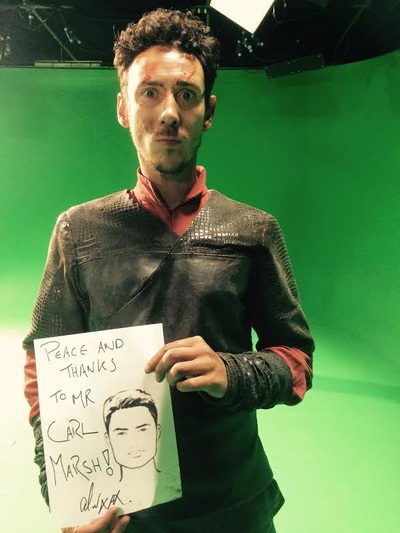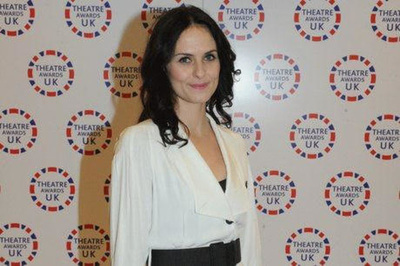James Norton
|
Buzz Magazine | February 2020 | Carl Marsh
|
|
Press play below to listen to the phone interview.
From playing a psychopath in Happy Valley to a crime-fighting vicar in Grantchester, James Norton is a man of many parts. In the new film Mr Jones, he stars as Gareth Jones, the heroic Welsh journalist who uncovered Stalin’s famine in Ukraine. How does this role compare? Carl Marsh finds out.
Were you aware of Gareth Jones and the Holodomor famine before you embarked on the film?
No, embarrassingly not. It was one of the stories which you read, and you can’t quite believe it. The fact that Gareth became the first man to singlehandedly blow the whistle on the Soviet Union and call them out for the Holodomor travesty, then ultimately pay the price of his life… What is even more embarrassing is that I didn’t know much about the Holodomor, at all. I felt a certain amount of shame, but it was also exciting to know that we were going to produce a film to shed light on it. When we were in Ukraine, the reaction we had from the people was so humbling and very powerful.
How did you go about researching the part?
Through a mixture of ways, really. The director Agnieszka Holland and writer Andrea Chalupa are both very well versed on this period. Especially Andrea because she was in touch with the Jones family – we had private emails and correspondences with them. We had the incredible resource of garethjones.org, a website that was set up by his family, and we had all the letters, notebooks, etc.
What was most valuable for me was uncovering the letters and reports. His great-aunt wrote about how great he was with children – he might not have had children of his own, but he had his nieces and nephews back in Wales and the kids loved him because he was their faithful, older uncle. That, for me, was very valuable because you hear about this very serious, earnest journalist on this mission to uncover the truth. You don’t necessarily hear so much about the private man. We were keen to bring out a sort of naivety, a sense of humour, a warmth, an awkwardness.
I have got to mention the Welsh accent… it’s very convincing! How did you go about learning and practicing the accent and the language? I mean, Welsh isn’t easy!
I had a great Welsh dialect coach who was there for all the big dialogue scenes. On set, there were plenty of Welsh accents: Celyn Jones, who was wonderful; Julian Lewis Jones who played ‘my dad’ Major Jones. It’s particularly unnerving when you’re filming with Welsh actors. You just feel extremely self-conscious about borrowing their language and their sounds. They were so helpful, so useful. Someone said to me, “Think about it, you’re playing a Welsh-speaking journalist who speaks fluent Russian. If you can deliver a Welsh accent, great, but you will be speaking both Welsh and Russian all at once!”
Was there anything that you learnt from working with the director Agnieszka Holland?
I didn’t realise how much of an icon she is. She is much more than a director and that became very apparent – particularly in the evenings when we were in the depths of Ukraine. [The crew] would be huddled into these small hotels and one of the producers would somehow always magic up a bottle of vodka. We were filming in -15 degrees, but the winds were -25. I had an electronic thermal with a battery pack on underneath my costume because it was so cold.
One of my favourite memories from the shoot is that she would sit there in silence waiting for us, and everyone would start to huddle together to keep warm. Agnieszka would start singing an old Polish folk song. The crew was made up of Ukrainians, Russians and Poles. I was the only Brit at times, and I would be in the middle of all these languages. Within about 20 seconds, you would have the whole crew singing this song at the top of their lungs. She was always our leader; she’d rally us together and we’d all sing songs. I have an immense amount of love and respect for her – that lady is the real deal.
What made you go to university to study theology?
Wow… that was a long time ago! When I was looking for a degree, I’d previously studied history, theology and English at A-level, and really enjoyed going to a Roman Catholic school and being exposed to the Benedictine faith. We had these incredible debates and I became fascinated by the idea of faith. When I went to study at Cambridge, the theology course offered so much more than just Christian theology – it had papers on imagination and the arts…
Theology will always remain a fascination to me, partly because of my school, having travelled in India and being exposed to a lot of religion. Half of the people that were doing my degree were there on the premise of faith, but I was very much studying because of my interest. I would encourage many people to study theology. I think that the more understanding that we have around institutionalised religions and the more acceptance we can have in this complicated, often dangerous world, the better.
Obviously then you went to RADA – a bit of a change?
It was. I always loved acting from a young age: I remember a moment, being five or six years old, and playing Joseph in the Nativity. I just loved it. I don’t know where it came from, because my family aren’t into acting at all. When I was at university, I was very lucky to meet a young director who encouraged me to apply to RADA and she allowed my farfetched, almost childish dream to turn into an adult reality. When you’re on your way to drama school in London, you realise that it is much more than a dream. I haven’t ever looked back.
Were you aware of Gareth Jones and the Holodomor famine before you embarked on the film?
No, embarrassingly not. It was one of the stories which you read, and you can’t quite believe it. The fact that Gareth became the first man to singlehandedly blow the whistle on the Soviet Union and call them out for the Holodomor travesty, then ultimately pay the price of his life… What is even more embarrassing is that I didn’t know much about the Holodomor, at all. I felt a certain amount of shame, but it was also exciting to know that we were going to produce a film to shed light on it. When we were in Ukraine, the reaction we had from the people was so humbling and very powerful.
How did you go about researching the part?
Through a mixture of ways, really. The director Agnieszka Holland and writer Andrea Chalupa are both very well versed on this period. Especially Andrea because she was in touch with the Jones family – we had private emails and correspondences with them. We had the incredible resource of garethjones.org, a website that was set up by his family, and we had all the letters, notebooks, etc.
What was most valuable for me was uncovering the letters and reports. His great-aunt wrote about how great he was with children – he might not have had children of his own, but he had his nieces and nephews back in Wales and the kids loved him because he was their faithful, older uncle. That, for me, was very valuable because you hear about this very serious, earnest journalist on this mission to uncover the truth. You don’t necessarily hear so much about the private man. We were keen to bring out a sort of naivety, a sense of humour, a warmth, an awkwardness.
I have got to mention the Welsh accent… it’s very convincing! How did you go about learning and practicing the accent and the language? I mean, Welsh isn’t easy!
I had a great Welsh dialect coach who was there for all the big dialogue scenes. On set, there were plenty of Welsh accents: Celyn Jones, who was wonderful; Julian Lewis Jones who played ‘my dad’ Major Jones. It’s particularly unnerving when you’re filming with Welsh actors. You just feel extremely self-conscious about borrowing their language and their sounds. They were so helpful, so useful. Someone said to me, “Think about it, you’re playing a Welsh-speaking journalist who speaks fluent Russian. If you can deliver a Welsh accent, great, but you will be speaking both Welsh and Russian all at once!”
Was there anything that you learnt from working with the director Agnieszka Holland?
I didn’t realise how much of an icon she is. She is much more than a director and that became very apparent – particularly in the evenings when we were in the depths of Ukraine. [The crew] would be huddled into these small hotels and one of the producers would somehow always magic up a bottle of vodka. We were filming in -15 degrees, but the winds were -25. I had an electronic thermal with a battery pack on underneath my costume because it was so cold.
One of my favourite memories from the shoot is that she would sit there in silence waiting for us, and everyone would start to huddle together to keep warm. Agnieszka would start singing an old Polish folk song. The crew was made up of Ukrainians, Russians and Poles. I was the only Brit at times, and I would be in the middle of all these languages. Within about 20 seconds, you would have the whole crew singing this song at the top of their lungs. She was always our leader; she’d rally us together and we’d all sing songs. I have an immense amount of love and respect for her – that lady is the real deal.
What made you go to university to study theology?
Wow… that was a long time ago! When I was looking for a degree, I’d previously studied history, theology and English at A-level, and really enjoyed going to a Roman Catholic school and being exposed to the Benedictine faith. We had these incredible debates and I became fascinated by the idea of faith. When I went to study at Cambridge, the theology course offered so much more than just Christian theology – it had papers on imagination and the arts…
Theology will always remain a fascination to me, partly because of my school, having travelled in India and being exposed to a lot of religion. Half of the people that were doing my degree were there on the premise of faith, but I was very much studying because of my interest. I would encourage many people to study theology. I think that the more understanding that we have around institutionalised religions and the more acceptance we can have in this complicated, often dangerous world, the better.
Obviously then you went to RADA – a bit of a change?
It was. I always loved acting from a young age: I remember a moment, being five or six years old, and playing Joseph in the Nativity. I just loved it. I don’t know where it came from, because my family aren’t into acting at all. When I was at university, I was very lucky to meet a young director who encouraged me to apply to RADA and she allowed my farfetched, almost childish dream to turn into an adult reality. When you’re on your way to drama school in London, you realise that it is much more than a dream. I haven’t ever looked back.
